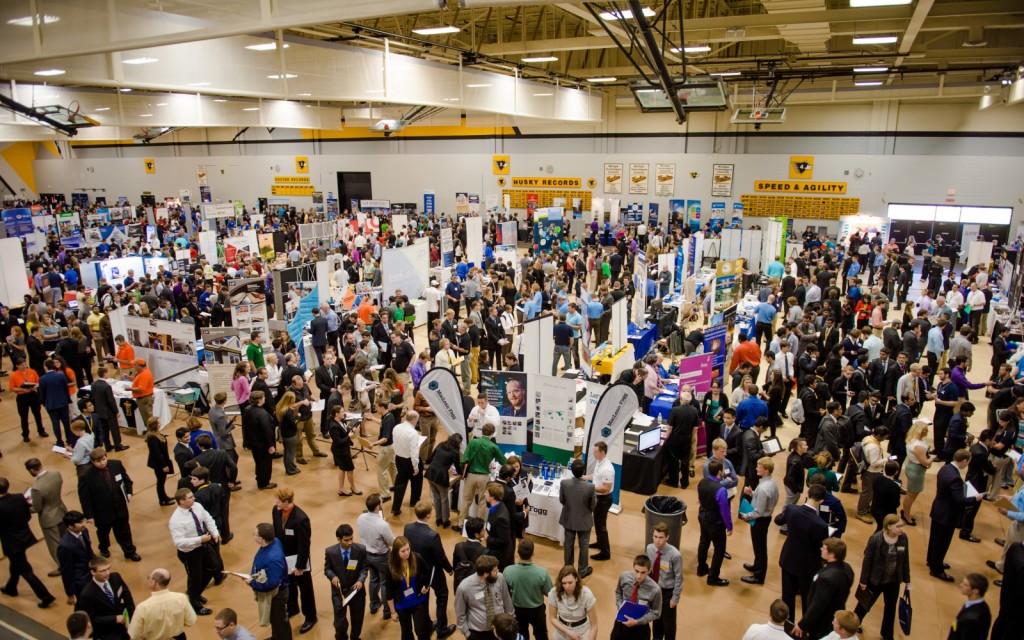 This past Tuesday Michigan Tech held its spring Career Fair at the Student Development Center. We had 227 recruiting organizations on campus, looking to hire our students and graduates for full-time, co-op, and internships positions. 139 of those companies were looking to hire electrical and/or computer engineers, among many others of course. The spring fair is always smaller than the fall version – last September we had 370 companies on campus – but even so, this is a big event by anyone’s standards. My hat’s off to the Michigan Tech Career Services office, which does an outstanding job for our students.
This past Tuesday Michigan Tech held its spring Career Fair at the Student Development Center. We had 227 recruiting organizations on campus, looking to hire our students and graduates for full-time, co-op, and internships positions. 139 of those companies were looking to hire electrical and/or computer engineers, among many others of course. The spring fair is always smaller than the fall version – last September we had 370 companies on campus – but even so, this is a big event by anyone’s standards. My hat’s off to the Michigan Tech Career Services office, which does an outstanding job for our students.
Over the years, Career Fair has become for me one of the most exciting and energizing days at Michigan Tech. You see students dressed to impress, and looking for that interview which could launch their career, and you see all the recruiters really interested in our students because of the value those students could bring to their organizations. I get the same story all the time – Michigan Tech students have a great work ethic and are ready to jump right in and make contributions, no matter where they land. A lot of people attribute this to our environment here, where students have to move a long way from Mom and Dad, develop as independent adults, and endure at least four harsh winters (although our little secret is that the winters are more fun than harsh.) Of course, we also believe that our educational programs that emphasize engineering and math fundamentals, individual skills, hands-on learning, and team projects have a lot to do with it too. Whatever the reasons might be, it is extremely gratifying to know that we are making a contribution to the economy and that our students are in demand. I heard anecdotal evidence that starting salaries for EEs are now pushing $70k and higher.
I like to talk to recruiters and find out what specific areas are in demand too. The hottest area for EEs right now, as it has been for several years, is controls. If you are not familiar with the field, control (in the engineering sense) is all about making things do what you want them to do, from cars to motors to appliances, to large factories and steel mills. The push toward automation in all areas of our society and economy is driving a demand for engineers who understand this field. Controls engineers tend to have broad interests, since to be successful one must have mastery over the mathematical fundamentals, as well as a working knowledge of the systems and components being controlled, which could be electrical, mechanical, or chemical. This combination of theoretical and practical skills seems to match our students pretty well.
We have been working to beef up the controls area of the ECE Department to meet this demand. What used to be an elective senior-level course in control theory was converted to a required junior-level course. Along with the School of Technology, we received a very generous gift from Nucor Steel to completely renovate a laboratory where EE and EET students learn about programmable logic controllers (PLCs) and their many applications; this is now known as the Nucor Industrial Control and Automation Laboratory. We still have one senior-level elective in digital and nonlinear control. ECE recently took over sponsorship of the Robotics Systems Enterprise. I do not think we are finished with this yet; I would love to see one or more additional courses that cover control system integration and the Internet of Everything, although this may take time and resources. Next year we may roll out a new Concentration in Controls Engineering, to go along with several existing concentration areas within the BSEE and BSCpE degree programs
You can see that events like the Career Fair do more than just find jobs for our students. Our relationships with industry partners help to inform us about what we need to be doing in our educational programs, both for them and for our students. I see a three-way “ecosystem” involving the university, the students, and industry, which right now seems to be working really well for everyone. The exciting challenge now is to keep those relationships thriving in an era of constant technological, economic, and societal change. There is something to look forward to every day!
– Dan
Daniel R. Fuhrmann
Dave House Professor and Chair
Department of Electrical and Computer Engineering
Michigan Technological University